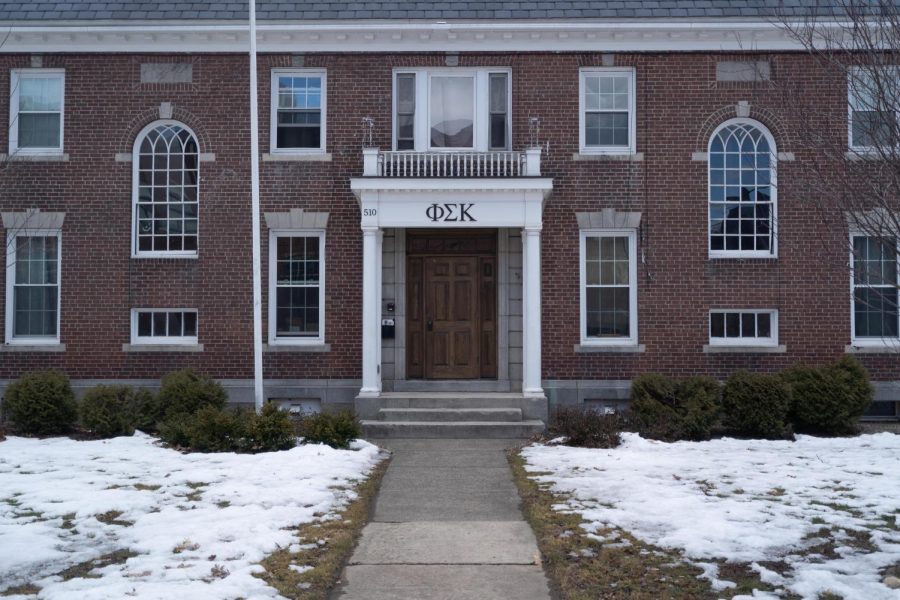We need an honest conversation about how Greek life fits into the University of Massachusetts campus.
There is a growing conversation across the country about Greek life’s role on college campuses, sparked mostly by allegations of sexual assault, hazing and racist practices. The common theme: a need for greater accountability at the university level.
Multiple studies have shown that fraternity brothers are three times more likely to sexually assault someone than other college men. Likewise, sorority sisters are 74 percent more likely to experience sexual assault in comparison to other college women.
Not all fraternity brothers are predators. Not all fraternities have brothers who are predators. There is, however, a tremendous amount of violence, including sexual violence that is concentrated around Greek life. A conversation about the larger impact of this dynamic on campus is, at the very least, warranted.
Tim Piazza became a household name when he died in early February 2017 at his fraternity house on Pennsylvania State University’s primary campus. With a staggering blood alcohol concentration of 0.36 percent, Piazza fell down the stairs of the fraternity house during a hazing event. His brothers waited nearly 12 hours to call for help, despite clear signs that Piazza needed medical attention. The following afternoon, Piazza was flown to a nearby hospital with several traumatic brain injuries and significant internal bleeding. Piazza passed away the next morning. Strings of text messages and extensive security footage of the fatal night show fraternity members discussing delaying medical help as Piazza fights for his life.
Piazza’s death was far from an isolated incident. Since 2005, more than 60 people have died in fraternity-associated incidents. For an article with The Atlantic, journalist Caitlin Flanagan completed a year-long dive into the tragic incidents occurring at college campuses around the country. She investigated a case from 2009 at the University of Idaho where a student had fallen from the third-floor window of a fraternity, sustaining permanent injuries and brain damage. Flanagan soon realized that a similar incident had occurred just 12 days before. In fact, both students fought for their lives in the same medical center at the same time. Just two months after both incidents, a student fell from a third-floor window of a fraternity at Washington State University. The only thing protecting his fall was a car parked right below him.
It’s easy to blame these types of incidents on hazing practices, but the truth is that each death is the direct result of a dangerous binge drinking culture, systemic violence and a lack of accountability. While University-level hazing policies can facilitate some positive change, they should not be a replacement for addressing the bigger issue.
Many argue that the Greek life system is far from broken because it was built to function this way from its conception. Fraternities and sororities were built for white, upper middle-class students, and that is who they continue to serve. At Washington and Lee University, which has a large Greek life presence, average annual dues fall at $11,316. The alarmingly high price alone perpetuates disparities in Greek life by limiting opportunities for involvement to those who can afford it. Throughout 2020, as dialogue about racial injustices grew amidst protests related to George Floyd’s death, many students came out with their experiences of racism in Greek life across the country.
So, is it possible to ban fraternities or Greek life all together on college campuses? The answer is a bit unclear. Fraternities have a long history, and it’s one that is rooted deeply in the celebration of the freedom of association. Washington politicians and interest groups have protected this freedom, even prohibiting public universities from banning fraternities on their campuses.
UMass, like thousands of other universities around the country that tout a large Greek life presence, have significant financial interests in keeping fraternities and sororities around. Universities also benefit financially from the alumni ties that Greek life creates. The culture, as dangerous as it is, serves as a major attraction for prospective students, targeting those looking for the “state school experience.”
I am not the first to write a call for broader conversations about Greek life. Articles in the Stanford Daily, Vanderbilt Hustler, Fordham Observer and Daily Pennsylvanian, among countless others, call for the abolishment of Greek life on their respective campuses. Instagram accounts like @abolishmsstategreeklife and @abolishstanfordgreek are leading the charge on social media.
Where is the accountability? Why are we letting a culture of violence with a problematic history thrive on our campus? Let’s start a conversation. Your move, UMass.
Tegan Oliver can be reached at [email protected].




















John Ortiz • Oct 12, 2021 at 6:35 pm
What does any of this have to with umass green life other than the picture of phi sig?
John Ortiz • Oct 12, 2021 at 6:23 pm
I promise nobody is paying anything close to that ridiculous number in dues annually at umass, I haven’t even payed mine since joining a frat.
Veronica • Oct 6, 2021 at 8:49 am
One place to start this conversation? The IG post by Theta on 10/5/21. The caption isn’t only insulting to people’s intelligence, it is active gaslighting. Straight out of the playbook against BLM protests as well. Focus on the one flipped car and say that violence is everywhere on campus, while completely ignoring that the high incidence of rape on this campus are the violence. Gaslighting is violence. Moving the goalposts to maintain status quo and power IS violence. Psychological manipulation is violence. Theta may be ‘innocent’ in this case but reveals itself in that IG post. Theta’s attempt to reconstruct the narrative is violence.
Joseph • Oct 6, 2021 at 8:38 am
Where is the research on UMass Greek alumni donations? What about UMass Greek dues rates, and whether they’re exclusionary on this campus?
I appreciate the hyperlinks to other pieces, but why not do research on figures and experiences at this campus before publishing?